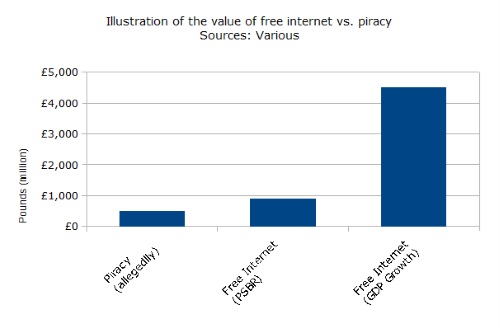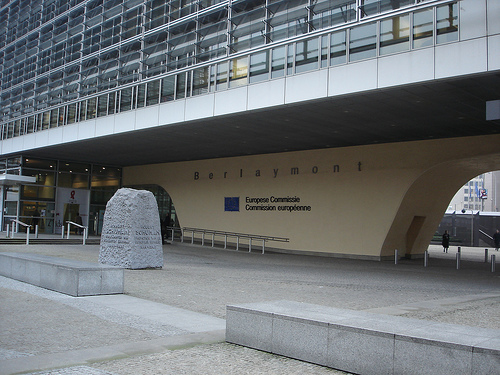Edit
Europe's winding road to Copyright Reform
Over the last six months things have been moving on Copyright Reform in the European Union. On the 19th February, the new Copyright Directive's rapporteur, the now sole Pirate Party MEP, Julia Reda, released her report, on which the JURI committee and later EP debates will take place.
- The Commission of the EU has made a proposal for an EU regulation on Copyright. The lead scrutiny committee within the European Parliament is JURI (otherwise known as (Legal Affairs) and they have appointed the Parliament's sole remaining Pirate Party MEP as 'rapporteur'. She published her report on 14th January and the press and interested parties have been commenting ever since. This story is published in reverse date order and covers some of the prequel, and some of the fallout from the report's publication.
- I originally reported this as a LIBE jurisdication but , I have been corrected.
- The New Statesman's Ian Steadman reports, reviewing the downsides of legal fragmentation, the raison d’etre of the Pirate Party, and picks up the proposals for harmonisation including that of longevity/duration where it is proposed that the Berne Treaty standard become the pan-European rule. The Statesman also picks up on reinforcing 1st sale rights i.e. the right to sell on one's property. It includes a significant number of quotes, looks at Reda's attempts to future proof the law and highlights the varied, if not unexpected, reactions. Neither the New Statesman nor most so called Copyright commentators labour the point that copyright harmonisation is a "Single Market" issue.
 The Pirate Party's lone MEP might just fix copyright across the EULast week saw the publication of a draft report on copyright reform in the EU, authored by German Pirate Party member Julia Reda. For those familiar with who the Pirates are and what they stand for, the fact that a Pirate MEP was given the job of copyright reform rapporteur might seem surprising - almost as surprising as the proposals themselves, which address many of the trickiest intellectual property issues within Europe with sense and moderation.
The Pirate Party's lone MEP might just fix copyright across the EULast week saw the publication of a draft report on copyright reform in the EU, authored by German Pirate Party member Julia Reda. For those familiar with who the Pirates are and what they stand for, the fact that a Pirate MEP was given the job of copyright reform rapporteur might seem surprising - almost as surprising as the proposals themselves, which address many of the trickiest intellectual property issues within Europe with sense and moderation.- One of the key issues in Copyright is the oddly plural, "Limitations and Exceptions". In the UK, these have just been reviewed and changed by Parliamentary statute. In August 2011, I attended a seminar on what were then proposals for change, and wrote up my notes in a blog article. The Hargreaves Review looked at the fitness of purpose of the UK's intellectual property rights law and proposed an extension of the exceptions and limitations to make research easier, to formalise educational use and to legalise format shifting. The article below has pointers to the Hargreaves Review Report and the broadly, again if unsurprisingly favourable responses from COADEC and the ORG. The delay between the Hargreaves Review's report and its implementation with a final delay to legalise format shifting, shows the controversy within the UK's political parties and the final under scoring of the controversy is UK Music's decision to apply for judicial review over the legalisation of format shifting.
 UK Music Industry Seeks Judicial Review Of Newly Introduced Copyright ReformsWe've got some interesting developments in the copyright policy world from across the pond to report on! Three UK music industry organizations (UK Music, The Musicians' Union and the British Academy of Songwriters, Composers and Authors) have banded together to seek out a judicial review of some new copyright legislation enacted by the UK government that went into force on October 1.
UK Music Industry Seeks Judicial Review Of Newly Introduced Copyright ReformsWe've got some interesting developments in the copyright policy world from across the pond to report on! Three UK music industry organizations (UK Music, The Musicians' Union and the British Academy of Songwriters, Composers and Authors) have banded together to seek out a judicial review of some new copyright legislation enacted by the UK government that went into force on October 1.- The Hargreaves Review and the final if grudging Parliamentary response suggests to me that there is little benefit from the Reda Report for the UK on the issues, except on duration, and possibly on the principle that hyper links are not copyright infringements. I thought that this was established in UK Law with the Rock & Overton ruling but several legal cases since seem to have contradicted this principle and laws to bind the European & British Courts would be good.
- Well RedIn August, earlier this year, Vince Cable announced the Government's response to the Hargreaves Review aka the Google review into intellectual property law. Some of the IT companies and many economists, including Google strongly believe that the current intellectual property laws in the UK inhibit innovation and persuaded Cameron to launch a review into the intellectual property laws which published its report "Digital Opportunity, A review of intellectual property and growth" earlier in the year.
- Amongst the commentators, Amelia Andersdottir, a Pirate Party MEP from the previous parliament is not happy, however, hidden in the weeds is the proposal that linking will be legal. Obviously she's not happy and argues that the EU Commission is more progressive on issues pertaining to database rights. So while the report fails to extend any radical agenda, it's possible as Reda argues that a more moderate agenda is more likely to succeed. It's also possible that by consolidating around the current consensus, the increasingly despotic demands of the content industry will be halted. Another thing to bear in mind is that some of the German (& Spanish) laws are stricter than those in the UK (and even the USA). So while the UK would see little short term change, other parts of Europe might benefit. Furthermore we shouldn't under estimate the importance of the German and Spanish language content & knowledge industries.
 Pirate Party MEP Fails to Deliver True Copyright Reform | TorrentFreakThe political discourse on copyright back in 2006 was uninspired and one-dimensional. Activism was not enough to change things, and the Pirate Party was formed as an alternative to the future visions propagated by content dinosaurs.
Pirate Party MEP Fails to Deliver True Copyright Reform | TorrentFreakThe political discourse on copyright back in 2006 was uninspired and one-dimensional. Activism was not enough to change things, and the Pirate Party was formed as an alternative to the future visions propagated by content dinosaurs.- On the issue of copyright longevity I have felt for some time that the locus of the wrongness in copyright law is the excessive duration and at Labour Conference 2012, at a fringe meeting I proposed that copyright duration be reduced to 20 years.
 Well RedAfter the Privacy meeting, I hobbled along to the Black Lion for Pragmatic Radicalism's "Top of the Manifestoes" event. This is cross between a Pecha Kucha presentation and a balloon debate. There is 60 seconds to present, two minutes of Q&A and then a vote and a second round for the top five.
Well RedAfter the Privacy meeting, I hobbled along to the Black Lion for Pragmatic Radicalism's "Top of the Manifestoes" event. This is cross between a Pecha Kucha presentation and a balloon debate. There is 60 seconds to present, two minutes of Q&A and then a vote and a second round for the top five.- Julia Reda posted the release of her report on her blog.
- @Senficon posted her launch comments as #LIBE rapporteur https://juliareda.eu/2015/01/report-eu-copyright-rules-maladapted-to-the-web/ … on #European #Copyright #Reform
- which I have rendered here....
- Andy at Torrentfreak comments on the report, concentrating on the fitness of the law, it mentions Reda's proposed commitments on fair reward for artists as opposed to publishers and intermediaries, protection of the public domain, requiring public information to be classified as public domain, exceptions for education and research.
 Pirate MEP Proposes Major Reform of EU Copyright | TorrentFreakJulia Reda, a politician for the German Pirate Party and member of the European Parliament, has this morning released her draft report for the overhaul of EU copyright. In her role as rapporteur, Reda says that EU copyright rules are "maladapted" to the increase of cross-border cultural exchange facilitated by the Internet.
Pirate MEP Proposes Major Reform of EU Copyright | TorrentFreakJulia Reda, a politician for the German Pirate Party and member of the European Parliament, has this morning released her draft report for the overhaul of EU copyright. In her role as rapporteur, Reda says that EU copyright rules are "maladapted" to the increase of cross-border cultural exchange facilitated by the Internet.- The IP Kat also reports on Reda's report, the IP Kat, unlike me, believes these changes are significant. On the legal framework, the report proposes some technical changes, which at one end could be significant as they play to the relationship between the single market treaties, the EU Fundamental Charter of Rights (which includes Copyright) and the European Charter of Human Rights (which does not). Reda proposes a single copyright framework ofr Europe, which is as to be expected, and to harmonise duration/longevity around the Berne Treaty minimum of life plus 50 years. Reda's report also proposes the mandatory pan-european harmonisation of exceptions and limitations together with a form of words which may act as the foundation of a "fair use" doctrine.
 The IPKatAs copyright-oriented IPKat folks will be aware of, this year promises to be an interesting one at the EU level. Not only because of the ever-active Court of Justice of the European Union (CJEU) here here , but also because the new Commission intends to table proposals to reform the current acquis.
The IPKatAs copyright-oriented IPKat folks will be aware of, this year promises to be an interesting one at the EU level. Not only because of the ever-active Court of Justice of the European Union (CJEU) here here , but also because the new Commission intends to table proposals to reform the current acquis.- In October, a new Commission took office and the Kroes was replaced by Oettinger. Out-Law.com looks at a press statement made to the German press and records Oetinger's ambitions to reform the law and balance the interests of users, ISSPs, news organisations, and artistic creators. The Out-Law article also points at their post on the fall out from Hargreaves.
- Oettinger sketches out EU copyright reforms timetableOettinger said a new tax on the display of copyrighted works by search engines could be imposed as part of the proposals, according to a report by German business news publication Handelsblatt. In Germany, copyright rules already require search engines and content aggregators to pay publishers in order to display snippets of their content in certain circumstances.
- At ORGcon14, Amelia Andersdottir spoke of her hope that the EU's coming Copyright Regulation would be a bright light in what seems to be a losing war. I didn't take notes for that session, but I did report on Cory Doctrow's key note speech which reiterates the arguments about the anti-civil liberty costs of copyright enforcement and its failure to encourage creativity or reward it.
 Well RedOrgcon14 was opened by its keynote speaker, Correy Doctrow, one of the UK's leading digital liberty campaigners. This presentation was a bit of a reprise although he concludes by addressing recent developments in the politics of surveillance in the UK.
Well RedOrgcon14 was opened by its keynote speaker, Correy Doctrow, one of the UK's leading digital liberty campaigners. This presentation was a bit of a reprise although he concludes by addressing recent developments in the politics of surveillance in the UK.- The IP Kat looks at some of the civic society lobbying of the Commission calling for greater harmonisation and also looks back to the immensely popular consultation exercise; I wonder if I helped as further below is my article on the consultation.
 The IPKatVia Katfriend The subject-line? "Fans of the recent In its letter to Mr Oettinger, the ECS re-affirmed this view, underscoring " Prof Bernt Hugenholtz (University of Amsterdam, IViR) comes the festive news that the ever active European Copyright Society (ECS) - launched in 2012 and composed of leading European copyright scholars with " the aim of creating a platform for independent and critical scholarly thinking on European copyright law" - sent Commissioner for Digital Economy and Society, Unification of copyright law".
The IPKatVia Katfriend The subject-line? "Fans of the recent In its letter to Mr Oettinger, the ECS re-affirmed this view, underscoring " Prof Bernt Hugenholtz (University of Amsterdam, IViR) comes the festive news that the ever active European Copyright Society (ECS) - launched in 2012 and composed of leading European copyright scholars with " the aim of creating a platform for independent and critical scholarly thinking on European copyright law" - sent Commissioner for Digital Economy and Society, Unification of copyright law".- The EDRi also submitted evidence to the Consultation and document their submission in a blog posting. There were 9,500 replies, which is higher than some, but was to be exceeded in orders of magnitude by the consultation on TTIP, the US-EU so called free trade agreement.
- The EC consultation on the review of EU copyright rules is over - EDRiOn 5 March 2014, three months after its launch, the European Commission closed the public consultation on the review of the EU copyright rules. This public consultation is part of the European Commission's effort to review and modernise copyright rules in the EU and to adapt the current system to the digital age.
- My evidence/submission to the EU's consultation, which covers limitations and exceptions, legal certainty and restricted licensing, particularly for low value and or non-commercial use, balance of fundamental rights, longevity, the impact of DRM and criminalisation of security research and proposing redress not punishment.
 Well RedI have today submitted evidence to the EU's Copyright Consultation. I used http://copywrongs.eu/ to help me, they filter the questions for you, and I wrote about exceptions (we, especially in the UK, need more) , clarity and derived works (again arguing for more), the balance of rights between copyright holders and citizens (more rights for citizens) and the appropriateness of old laws and concepts to the digital age (they aren't).
Well RedI have today submitted evidence to the EU's Copyright Consultation. I used http://copywrongs.eu/ to help me, they filter the questions for you, and I wrote about exceptions (we, especially in the UK, need more) , clarity and derived works (again arguing for more), the balance of rights between copyright holders and citizens (more rights for citizens) and the appropriateness of old laws and concepts to the digital age (they aren't).- Andy at Torrentfreak, in 2013, comments on the EU's public consultation plans on Copyright reform
.jpg) EU Offers Public a Chance to Fix Copyright Law | TorrentFreakCopyright and the Internet have been struggling to get along for many years and some feel we are now due a comprehensive update of the former in order for it to work more harmoniously with the latter. In deciding how to progress the EU Commission has opened a public consultation which allows all citizens - even those in the U.S.
EU Offers Public a Chance to Fix Copyright Law | TorrentFreakCopyright and the Internet have been struggling to get along for many years and some feel we are now due a comprehensive update of the former in order for it to work more harmoniously with the latter. In deciding how to progress the EU Commission has opened a public consultation which allows all citizens - even those in the U.S.


